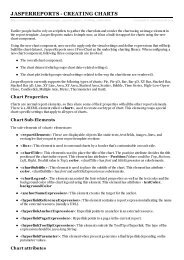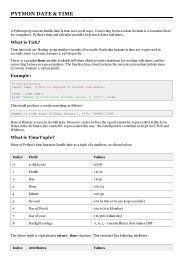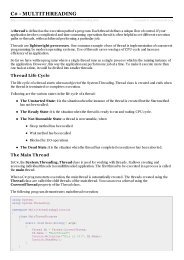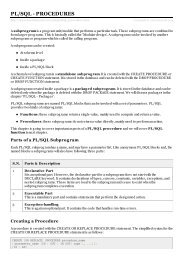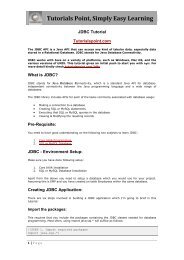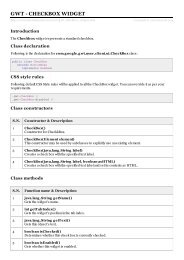Download Scala Tutorial (PDF Version) - Tutorials Point
Download Scala Tutorial (PDF Version) - Tutorials Point
Download Scala Tutorial (PDF Version) - Tutorials Point
Create successful ePaper yourself
Turn your PDF publications into a flip-book with our unique Google optimized e-Paper software.
Value = 1<br />
C:/><br />
Convert to String:<br />
You can use Tuple.toString() method to concatenate all the elements of the tuple into a string. Following is the<br />
example to show the usage:<br />
object Test {<br />
def main(args: Array[String]) {<br />
val t = new Tuple3(1, "hello", Console)<br />
}<br />
}<br />
println("Concatenated String: " + t.toString() )<br />
When the above code is compiled and executed, it produces the following result:<br />
C:/>scalac Test.scala<br />
C:/>scala Test<br />
Concatenated String: (1,hello,scala.Console$@281acd47)<br />
C:/><br />
Swap the Elements:<br />
You can use Tuple.swap method to swap the elements of a Tuple2. Following is the example to show the usage:<br />
object Test {<br />
def main(args: Array[String]) {<br />
val t = new Tuple2("<strong>Scala</strong>", "hello")<br />
}<br />
}<br />
println("Swapped Tuple: " + t.swap )<br />
When the above code is compiled and executed, it produces the following result:<br />
C:/>scalac Test.scala<br />
C:/>scala Test<br />
Swapped tuple: (hello,<strong>Scala</strong>)<br />
C:/><br />
<strong>Scala</strong> Options<br />
<strong>Scala</strong> Option[T] is a container for zero or one element of a given type. An Option[T] can be<br />
eitherSome[T] or None object, which represents a missing value. For instance, the get method of <strong>Scala</strong>'s Map<br />
produces Some(value) if a value corresponding to a given key has been found, or None if the given key is not<br />
defined in the Map. The Option type is used frequently in <strong>Scala</strong> programs and you can compare this to null value<br />
available in Java which indicate no value. For example, the get method of java.util.HashMap returns either a value<br />
stored in the HashMap, or null if no value was found.<br />
Let's say we have a method that retrieves a record from the database based on a primary key:<br />
def findPerson(key: Int): Option[Person]<br />
TUTORIALS POINT<br />
Simply Easy Learning



